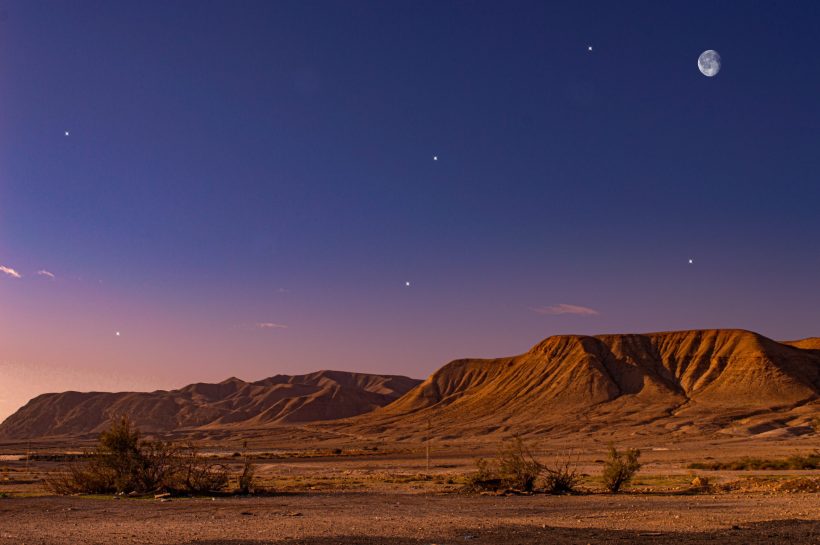For three years I lived near the mountains. One peak was readily visible from my apartment, and a short drive took me within view of others. I suppose people born and bred in mountain states get used to seeing the soaring splendor out their windows, but as a girl from flyover country, I never did. “Lifting my eyes to the hills” was a daily highlight.
Why the psalmist looks to the hills depends on which hills are in view.
The psalmist of Psalm 121 lifts his eyes to the hills, often translated “mountains” (v. 1), but probably not to admire them. For starters, the “hills” of Israel are not exactly majestic peaks; they are rugged hills. Why the psalmist looks to the hills depends on which hills are in view—and this is actually a much-debated question about the psalm. There are three common, but not unrelated, suggestions:
- The hills on the way to Jerusalem. Psalm 121 is a pilgrim song, and the psalmist is traveling to Jerusalem from other parts of Israel. There are mountains to traverse, and they sometimes signaled danger. Mountains were sparsely populated, desolate regions where wild animals lurked. Unsavory people lurked there too, waiting to relieve passersby of what might be in their pockets. The parable of the Good Samaritan reflects this potential danger. If these are the mountains in view, the psalmist lifts his eyes to the dangers he must navigate and wonders, “Where am I going to find help?”
- The hills around Jerusalem, around Mount Zion, where the Lord’s temple was. Another song of ascent talks about these mountains: “Those who trust in Yahweh are like Mount Zion, which cannot be shaken but endures forever. As the mountains surround Jerusalem, so Yahweh surrounds his people, both now and forever” (Ps. 125:2). In this case, the psalmist lifts his eyes to the hills and finds comfort in the place from which help would come.
- The hills where the gods lived. We have only to think of Mount Olympus, the home of the Greek gods, to imagine this scenario. For ancient Near Easterners, the mountains were where gods lived. (It’s not insignificant that Yahweh himself dwells on “Mount” Zion.) Israel’s idolatrous neighbors worshiped a pantheon of gods whose earthly abodes were in the mountains. These gods made the sun shine, rain fall, and crops grow. People depended on the gods for their lives and livelihoods.
Our psalmist says, I lift up my eyes to the hills, that place where the gods live, and he asks, “Where am I going to find help for my journey? Which of the gods is going to help me?”[1]
Which god is going to help? We are on a difficult journey, and we need help. All of these gods and many others offer it, but it’s always temporary at best and harmful at worst.
It’s a question we often ask, too—rather we realize it or not.
- Which god will comfort me in my disappointment? Shopping? Food? Alcohol?
- Which god will satisfy my loneliness? Sex? Relationships? Having children?
- Which god will make me happy? Money? Success? Fun?
- Which god will fix my marriage, make my kids turn out right, or give me a fulfilling occupation? A better job? A private school? A college degree?
Which god is going to help? We are on a difficult journey, and we need help. All of these gods and many others offer it, but it’s always temporary at best and harmful at worst.
Which god is going to help? The psalmist quickly answers his own question—“My help comes from YHWH, the one who made heaven and earth.” Next week we’ll reflect on the significance of this answer.
[1] A few translations (most notably, the KJV) read the psalmist’s words as a statement—“I will lift up mine eyes unto the hills, from whence cometh my help.” But the Hebrew is clearly a question—and the New King James makes the correction (“I will lift up my eyes to the hills—From whence comes my help?).
Photo by Akhil Lincoln on Unsplash



A nice summation. I’m sorry to learn about the question mark, though, having grown up on the certitude of the KJV!
Ha! Sorry about that. 😉
I found you!
This is so well done.
I love it that the Psalms have so may questions; so do we.
Donna! Thanks for finding me! It’s so good to hear from you. 🙂 I love the questioning of the Psalms, too. They are so real. 🙂
Please check your Facebook messenger!